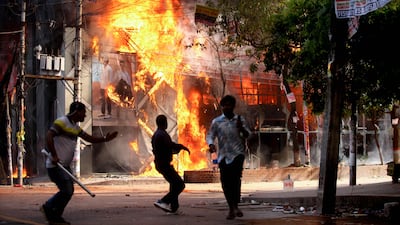LATEST: Sheikh Hasina quits and flees country
There was a heavy security presence in Bangladesh's capital on Monday as soldiers and police patrolled key roads after at least 98 people were killed in renewed anti-government demonstrations a day earlier.
The military imposed an indefinite curfew and authorities cut off mobile internet in an attempt to stem further unrest, while roads leading to Prime Minister Sheikh Hasina's residence in Dhaka were closed off.
Sunday's violence raised the overall death toll from weeks of protests against quotas in government jobs to 300, according a tally compiled by AFP using data from police reports, officials and doctors. No official death toll has been issued.

The system was scrapped by Ms Hasina’s government in 2018 after a student protest.
However, protests began in June after the Bangladesh High Court reinstated the system of reserving 30 per cent of public sector jobs for relatives of veterans of the country’s independence war.
The moved was overturned by the Supreme Court last month, which described the reinstatement as illegal and ruled that 93 per cent of jobs would now be allocated on merit while the remainder would be set aside for specific categories.
The quotas were introduced in 1972 by Sheikh Mujibur Rahman, father of the current Prime Minister, who led his country’s fight for independence from Pakistan.
The military-imposed curfew went into effect Sunday night and covered Dhaka and other division and district headquarters. The government had earlier imposed a widespread curfew, except for some areas in the capital and elsewhere.
The government also announced a holiday from Monday to Wednesday, with courts closed indefinitely. Mobile internet services were cut off, with Facebook and messaging apps such as WhatsApp inaccessible.

Ms Hasina said the protesters who engaged in “sabotage” and destruction were no longer students but criminals, and she said the people should deal with them with iron hands.
The Prime Minister's ruling Awami League party said demands for her resignation showed that the protests had been taken over by the main opposition Bangladesh Nationalist Party and the now-banned Jamaat-e-Islami party.
At least 11,000 people have been arrested in recent weeks. The unrest has also resulted in the closure of schools and universities across the country and authorities, at one point, imposed a shoot-on-sight order against protesters.


